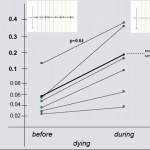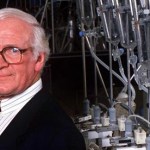physiology
Here is a neat video that I watched at the David Bruce Undergraduate Poster session at the Experimental Biology conference last week. It describes the amazing physiology of the avian lung and was created by an undergraduate student researcher, Peter Luu for the Physiology Video Contest sponsored by the American Physiological Society. This video won the Viewer's Choice Award:
To see more of the submitted videos, visit the American Physiological Society website.
I am very excited about the Experimental Biology conference that starts this weekend. I have my bags packed, my poster printed and I am heading to the airport to catch my plane. I can't wait to learn about all of the exciting physiology (especially comparative physiology) research. I will be sure to keep you up-to-date as well!
I am very excited about the upcoming Experimental Biology conference that starts next weekend. I just looked through the Spring newsletter for the Comparative and Evolutionary Physiology section of the American Physiological Society. Check out the exciting programming in comparative physiology at this year's conference:
Monday, April 28
10:30 AM – 12:30 PM
Featured Topic: Abstract-Driven Trainee Session
3:15 PM – 5:15 PM
Featured Topic: Comparative Physiology of Aging and Senescence
Tuesday, April 29
8:00 AM – 10:00 AM
CEPS Symposium: RNAseq Approaches to…
I am very excited to report that the Puerto Rico Physiological Society will be hosting their 4th annual meeting, "Exercise Physiology: From Molecules to Systems" on February 8th.
PRPS 2014 Save the Date
Last year's meeting was focused on mitochondria and was a big success. This year's meeting is shaping up to be similarly successful.
Image from Reuters and The NY Times
Congratulations to Drs. Randy W. Schekman, Thomas C. Südhof and James E. Rothman (above left to right) for earning the 2013 Nobel Prize in Physiology or Medicine for their research in "discoveries of machinery regulating vesicle traffic, a major transport system in our cells."
Cells often make products like hormones and neurotransmitters that need to exit the cell in order to simulate or inhibit other cells. The reason these three scientists were selected for the award is that their research discovered how cells regulate the export of vesicles…
I just watched a neat video describing how animals adapt to their environments to increase survival:
In honor of the 125th anniversary of The American Physiological Society, a history of its founding was just published in Advances in Physiology Education. It reads like a Who's Who list of some of the most important contributors to our understanding of modern physiology. Where would physiology research be in this country without this important society and the hard work of its founding fathers?
Founders of The American Physiological Society from Ryan, 2013
To read more about these pioneering men, and the history of physiology in the US, click here.
Source:
Ryan KL. APS at 125: a look back…
On a recent visit to The American Physiological Society's website, I found this amazing story on regeneration that I thought you might enjoy:
This summer’s action film, “The Amazing Spider-Man™,” is another match-up between the superhero and his nemesis the Lizard. Moviegoers and comic book fans alike will recall that the villain, AKA Dr. Curt Connors, was a surgeon who, after losing an arm, experimented with cell generation and reptilian DNA and was eventually able to grow back his missing limb. The latest issue of the journal Physiology contains a review article that looks at…
Death has been everywhere in the news media since the announcement of Bin Laden's demise on Sunday. How this historic event will affect global terrorism is unknown; perhaps the most important news of all was of the treasure trove of computers and files found in Bin Laden's luxury "compound."
With this event in mind, I came across today one of the strangest (some might say creepy) studies I have ever read - a biochemical study on death and dying. Researchers have found that death and dying can invoke euphoria and something like an "unbearable lightness." Seriously.
In a study published in…
Photo source.
Kisses are a better fate than wisdom.
{e. e. cummings}
Just in time for Valentine's Day! The Science of Kissing is Everywhere. {NPR, NBC's The Today Show, Time, Newsday...}
Kissing is one of the most intimate things we do. What does it mean?
This post is worth bringing back for Valentine's Day!
A private act, it embodies romanticism, friendship, parental safe harbor as a child drifts into sleep, a casual greeting or whimsical play. Kissing can have wildly different meanings, depending upon context, timing and the partners, ranging from innocent to illicit. Kissing is…
It's that time of year again-- the Swedes will be handing out money to famous scientists, with the announcements of who's getting what starting one week from today. Thus, the traditional Uncertain Principles Nobel Prize Picking Contest:
Leave a comment on this post predicting the winner(s) of one of this year's Nobel Prizes. Anyone who correctly picks both the field and the laureate will win a guest-post spot on this blog.
The usual terms and conditions apply. If you don't have anything you'd like to guest-post about, you can exchange your guest post for a signed copy of How to Teach Physics…
If you picked up The Poisoner's Handbook (amazon.com) looking for a fool-proof recipe, I hope you have read the book through and realized at the end that such a thing does not exist: you'll get busted. If they could figure it all out back in 1930s, can you imagine how much easier they can figure out a case of poisoning today, with modern sensitive techniques? And if you have read the book through, I hope you found it as fascinating as I did. Perhaps you should use your fascination with poisons to do good instead, perhaps become a forensic toxicologist?
My SciBling Deborah Blum (blog, Twitter…
tags: vultures, Gyps species, conservation biology, endangered species, veterinary medicine, toxicology, physiology, evolutionary biology, pharmaceutical chemistry, epidemiology, mathematical modeling, researchblogging.org,peer-reviewed research, journal club
Only thirty years ago, tens of millions of White-rumped Vultures, Gyps bengalensis,
were flying the skies of Asia. They are now classified as Critically Endangered.
Image: Marek Jobda / rarebirdsyearbook.com [larger view]
A zombie is another name for The Walking Dead -- those who are lifeless, apathetic, or totally lacking in…
Last week, my SciBling Jason Goldman interviewed me for his blog. The questions were not so much about blogging, journalism, Open Access and PLoS (except a little bit at the end) but more about science - how I got into it, what are my grad school experiences, what I think about doing research on animals, and such stuff. Jason posted the interview here, on his blog, on Friday, and he also let me repost it here on my blog as well, under the fold:
Here at Thoughtful Animal headquarters, we're starting a new series of seven-question interviews with people who are doing or have done animal…
Blame 'Night of the Living Dead' for this, but many people mistakenly think that zombies are nocturnal, going around their business of walking around town with stilted gaits, looking for people whose brains they can eat, only at night.
You think you are safe during the day? You are dangerously wrong!
Zombies are on the prowl at all times of day and night! They are not nocturnal, they are arrhythmic! And insomniac. They never sleep!
Remember how one becomes a zombie in the first place? Through death, or Intercision, or, since this is a science blog and we need to explain this scientifically,…
Whenever I read a paper from Karl-Arne Stokkan's lab, and I have read every one of them, no matter how dense the scientese language I always start imagining them running around the cold, dark Arctic, wielding enormous butterfly nets, looking for and catching reindeer (or ptarmigans, whichever animal the paper is about) to do their research.
If I was not so averse to cold, I'd think this would be the best career in science ever!
It is no surprise that their latest paper - A Circadian Clock Is Not Required in an Arctic Mammal (press release) - was widely covered by the media, both…
The party isn't over yet! Here's another helping of Monday Pets. Enjoy!
Wild Dog crawled into the Cave and laid his head on the Woman's lap... And the Woman said, "His name is not Wild Dog any more, but the First Friend."
--Just So Stories, Rudyard Kipling.
Archaeological evidence indicates that dogs were already a part of human society around the end of the Ice Age. Small dog skeletons have been unearthed in human communities as far back as 6- to 12-thousand years ago in Europe, the Middle East, and China. The jawbone of a domestic dog was found in a late Paleolithic grave in Germany, and…
Who knew?
As I am stuttering through recovery from LungMutiny2010, I am paying more attention to my diet. So, as I try to go out for my 10 min walk everyday, I still drink some sports drink - usually Gatorade made from the massive vat of powder you can buy here at Costco.
We tend to get plenty of sodium in our diet - far too much in the US, actually - but I always worry about potassium when I am sweating (Disclaimer: I am not an exercise physiologist or a cardiovascular or nephrology physician.).
I always thought that the widely-sold sports drinks were the best sources of potassium outside of…
Have you ever taken one of the now-over-the-counter heartburn relief remedies like Tagamet, Zantac, or Pepcid?
How about the beta-blocker atenolol (Tenormin) or metoprolol (Lopressor) for antihypertensive therapy, or the original less-selective beta-blocker propranolol (Inderal) for migraines, presentation anxiety or stage fright?
If you answered yes to either question, you owe a debt of gratitude to Sir James Black, the Scottish physician who left us earlier this week at age 85. The best obituary I have seen memorializing Sir James comes from the UK Telegraph.
Black was called the father…
From the NC Museum of Natural Sciences:
OUR BODIES: The Final Frontier
Tuesday, March 23, 2010 - 6:30-8:30 pm with discussion beginning
at 7:00 followed by Q&A
Location: Tir Na Nog 218 South Blount Street, Raleigh, 833-7795
We have come to think of the world as known. It isn't. Even basic parts of our own bodies remain totally unexplored. For example, have you ever stopped to wonder why you are naked? Aside from naked mole rats, we are among the only land mammals to be essentially devoid of hair. Why? Join us for a discussion about the human body and its adaptations…








